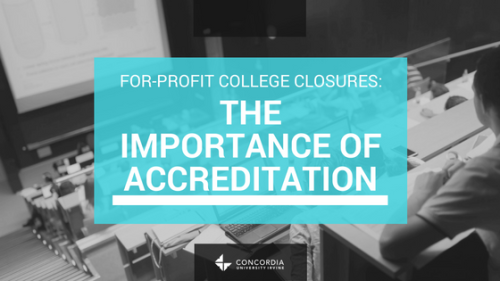For-Profit College Closures: The Importance of Accreditation

Over 30,000 students were recently displaced due to the closure of ITT Technical Institute. This is not the first for-profit closure that has impacted thousands of students in the past few years. Heald and Corinthian Colleges are other recent examples. In addition to the students being affected, more than 8,000 employees were let go as the for-profit giant closed down 137 campuses in 38 states.
ITT and other for-profit, non-regionally accredited institutions have been under investigation for years for fraud, deceptive marketing, and driving students into debt. Senator Elizabeth Warren (D-Mass) holds ITT executives responsible for its closure. Warren stated on her Facebook page,
“The only people responsible for ITT Tech’s collapse are ITT Tech’s executives who sucked students into low-quality education programs so they could boost profits and take home bigger paychecks.”
As the rich get richer, students get poorer. Not only are they driven into debt, but they are paying for no education whatsoever. So who holds these institutions accountable for providing a quality education? Two words – regional accreditors.
Before I talk about regional accreditors, I want to first speak about the importance of accreditation, both national and regional. First off, what does accreditation mean to you? For me, and employees like me who work in higher education institutions, it means job security. But for you, the student, the stakes are even higher. Attending an accredited institution means you are eligible for financial aid. More importantly, it means that you are receiving a quality education. Your degree actually means something. Accreditors hold institutions to a specific standard. They do so through compliance audits, review of financial indicators, assessment of student learning, etc. The focus is on accountability, accessibility, and transparency. The majority of non-profit or state-owned schools are regionally accredited.
If you did not know, Concordia University Irvine is regionally accredited. For-profit schools are either not accredited or they are nationally accredited. Regional accreditation is more focused on academic rigor and ensuring the curriculum is academically focused and relevant. So how does our university ensure academic rigor? Assessment! Every year, we assess our academic programs to ensure student learning and program effectiveness. We want to know what works and what does not work, what are we doing well and what can we improve on.
So why should you care that the institution you attend is regionally accredited? Is it just a logo we can put on the website? Does that stamp of approval mean anything to you? Yes, it does! It means a lot. It means that your degree matters and your credits are widely accepted by other institutions. The majority of regionally accredited institutions, like Concordia University Irvine, will only accept regionally accredited units upon matriculation. You do not want to retake a class that you have already taken, paid for, and passed, and you want to be able to say your degree means something. On a side note, some professional exams or boards will only accept students from regionally accredited institutions. If you are planning on attending graduate school, this is important to you!
In 2013, Concordia University Irvine went through its reaffirmation for accreditation. Every three to ten years (ten is the maximum), institutions are required to go through a thorough review where the following standards must be evaluated:
- Standard 1: Defining Institutional Purposes and Ensuring Educational Objectives
- Standard 2: Achieving Educational Objectives Through Core Functions
- Standard 3: Developing and Applying Resources and Organizational Structures to Ensure Quality and Sustainability
- Standard 4: Creating an Organization Committed to Quality Assurance, Institutional Learning and Improvement
Following the review, Concordia University Irvine received a ten-year reaffirmation from the Western Association of Schools and Colleges (WASC). This is the maximum length of time that accreditation can be awarded. In the report, the Core Curriculum (now Q&I) was highly commended for ensuring a meaningful and rigorous education. Again, your degree means something, it means a lot. Thank you, Core!
In brief, accreditation matters, especially regional accreditation. As mentioned, the majority of for-profit institutions are nationally accredited, like ITT Tech. Unfortunately, national accreditors do not hold institutions to the same rigorous standards as do regional accreditors. Next time you take a course at another institution, make sure its regionally accredited (like us).
This post was written by Deborah Lee, Director of Institutional Research and Assessment and Accreditation Liaison Officer at Concordia University in Irvine, California.


